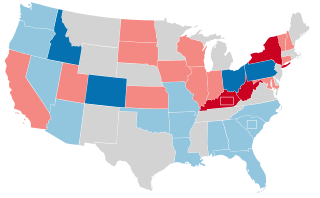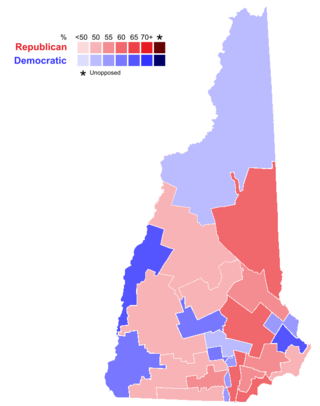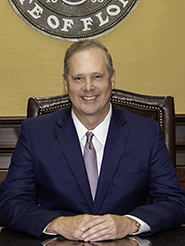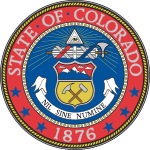
The 1974 United States Senate elections were held on November 5, with the 34 seats of Class 3 contested in regular elections. They occurred in the wake of the Watergate scandal, Richard M. Nixon's resignation from the presidency, and Gerald Ford's subsequent pardon of Nixon. Economic issues, specifically inflation and stagnation, were also a factor that contributed to Republican losses. As an immediate result of the November 1974 elections, Democrats made a net gain of three seats from the Republicans, as they defeated Republican incumbents in Colorado and Kentucky and picked up open seats in Florida and Vermont, while Republicans won the open seat in Nevada. Following the elections, at the beginning of the 94th U.S. Congress, the Democratic caucus controlled 60 seats, and the Republican caucus controlled 38 seats.

The 1956 United States Senate elections were elections for the United States Senate that coincided with the re-election of President Dwight D. Eisenhower. The 32 seats of Class 3 were contested in regular elections, and three special elections were held to fill vacancies. Although Democrats gained two seats in regular elections, the Republicans gained two seats in special elections, leaving the party balance of the chamber unchanged.

The 1954 United States Senate elections was a midterm election in the first term of Dwight D. Eisenhower's presidency. The 32 Senate seats of Class 2 were contested in regular elections, and six special elections were held to fill vacancies. Eisenhower's Republican party lost a net of two seats to the Democratic opposition. This small change was just enough to give Democrats control of the chamber with the support of an Independent who agreed to caucus with them; he later officially joined the party in April 1955.

John P. Morse is an American former politician who was a state senator in the Colorado Senate from 2007 to 2013, serving as president of the senate in 2013. He is a member of the Democratic Party. Morse represented Senate District 11, which encompassed at the time Manitou Springs, Colorado, and eastern Colorado Springs. On April 17, 2009, he was selected to become Colorado's next Senate Majority Leader, following the resignation of Senate President Peter Groff and the promotion of previous Majority Leader Brandon Shaffer. On September 10, 2013, Morse was recalled from office as a reaction to his involvement in passing gun control laws. He was the first legislator to be successfully recalled in the state's history.
The following table indicates the party of elected officials in the U.S. state of Colorado:

The 2002 United States elections were held on November 5, in the middle of Republican President George W. Bush's first term. Republicans won unified control of Congress, picking up seats in both chambers of Congress, making Bush the first president since Franklin D. Roosevelt in 1934 to gain seats in both houses of Congress. In the gubernatorial elections, Democrats won a net gain of one seat. The elections were held just a little under fourteen months after the September 11 attacks. Thus, the elections were heavily overshadowed by the War on Terror.

Evie Hudak is an American politician who served in the Colorado Senate from the 19th district as a member of the Democratic Party from 2009 to 2013. Prior to her tenure in the state senate she served on the Colorado State Board of Education from the 2nd congressional district from 2001 to 2009.

The 2000 United States elections were held on November 7, 2000. Republican governor George W. Bush of Texas defeated Democratic Vice President Al Gore of Tennessee in the presidential election. Republicans retained control of both houses of Congress, giving the party unified control of Congress and the presidency for the first time since the 1954 elections.

The Colorado recall election of 2013 was a successful effort to recall two Democratic members of the Colorado Senate following their support of new gun control legislation. Initially four politicians were targeted, but sufficient signatures could only be obtained for State Senate President John Morse and State Senator Angela Giron.

Tracy Kraft-Tharp is an American teacher and politician who serves on the county commission in Jefferson County, Colorado. Prior to her tenure on the county commission she served in the Colorado House of Representatives from the 29th district from 2013 to 2021, as a member of the Democratic Party.

A general election was held in the U.S. state of Colorado on November 4, 2014. All of Colorado's executive officers were up for election as well as a United States Senate seat and all of Colorado's seven seats in the United States House of Representatives. Primary elections were held on June 24, 2014.

The 2018 Colorado State Senate elections took place as part of the biennial United States elections. Colorado voters elected state senators in 17 of the 35 districts in the state senate. State senators serve four-year terms in the Colorado State Senate. The Colorado Reapportionment Commission provides a statewide map of the state Senate here, and individual district maps are available from the U.S. Census here.

Colorado's 11th Senate district is one of 35 districts in the Colorado Senate. It has been represented by Democrat Tony Exum since 2023. Prior to redistricting the district was represented by Democrats Pete Lee and Michael Merrifield.

Colorado's 19th Senate district is one of 35 districts in the Colorado Senate. It has been represented by Democrat Rachel Zenzinger since 2017, following her defeat of incumbent Republican Laura Woods.

The 2016 New Hampshire Senate election was held on November 8, 2016, concurrently with the elections for the New Hampshire House of Representatives, to elect members to the 165th New Hampshire General Court. All 24 seats in the New Hampshire Senate were up for election. It resulted in Republicains maintaining control of both chambers of the New Hampshire General Court.

The 2020 Colorado Senate elections took place on November 3, 2020, with the primary elections held on June 30, 2020. Voters in 18 out of 35 districts of the state Senate elected their representative for a four-year term. It coincided with the state House elections and the biennial United States elections. The Democratic Party retained control of the Senate, winning 20 seats, and increased their majority by one, gaining the 27th district from the Republican Party.

The 2022 elections for the Florida State Senate took place on Tuesday, November 8, 2022, to elect state senators from all 40 districts. Although on ordinary years, 20 senators are elected at a time on a staggered basis, races following redistricting elect all 40 members to ensure that each member represents an equal number of constituents. The Republican Party expanded their Senate majority from 24 to 28, gaining a supermajority in the Senate. The concurrently held House elections also resulted in a supermajority, giving Republicans supermajority control of the legislature.

The 2022 Colorado Senate elections took place on November 8, 2022, along with elections in the State House of Representatives, with the primary elections held on June 28, 2022. Voters in 17 out of the 35 districts of the Colorado Senate elected their representative for a four-year term. It coincided with other Colorado elections of the same year and the biennial United States elections.

The 2016 Vermont Senate election took place as part of the biennial United States elections. Vermont voters elected State Senators in all 30 seats. State senators serve two-year terms in the Vermont Senate. The election coincided with elections for other offices including the Presidency, U.S. Senate, U.S. House, Governor, and State House. A primary election held on August 9, 2016 determined which candidates appeared on the November 6 general election ballot.

The 2014 Vermont Senate election took place as part of the biennial United States elections. Vermont voters elected State Senators in all 30 seats. State senators serve two-year terms in the Vermont Senate. The election coincided with elections for other offices including the U.S. House, Governor, and State House. A primary election held on August 26, 2014 determined which candidates appeared on the November 4 general election ballot.


















